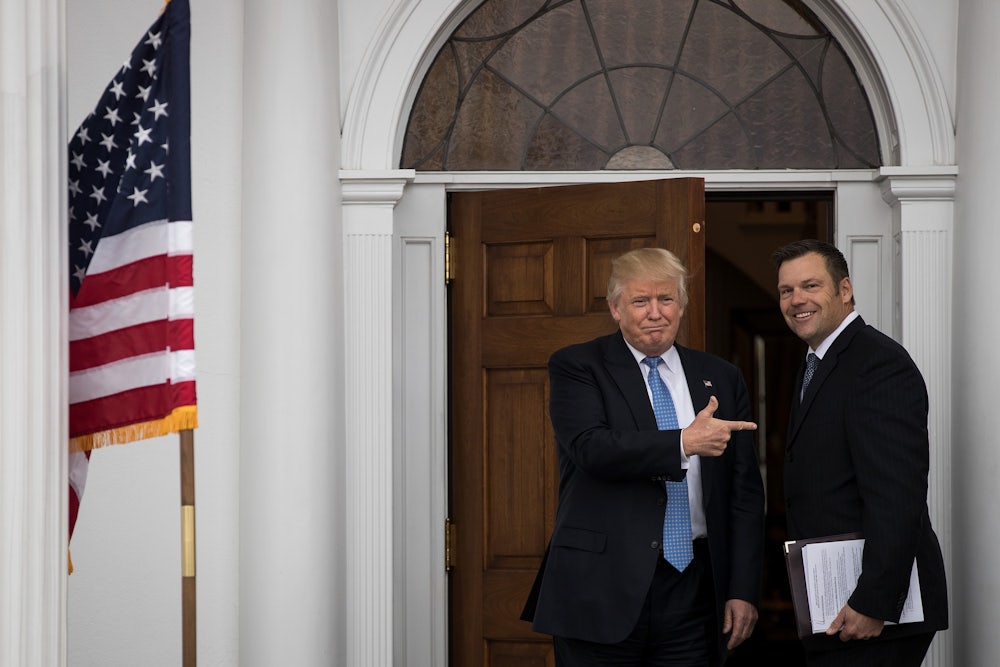Voting rights advocates have good reason to celebrate the demise of President Donald Trump’s controversial Advisory Commission on Election Integrity, which he shut down on Wednesday amid mounting legal challenges. “Despite substantial evidence of voter fraud,” he said, incorrectly, “many states have refused to provide the [commission] with basic information relevant to its inquiry.” He also cited “endless legal battles at taxpayer expense.”
But the biggest threat posed by the commission—that the administration will seek to match state voter rolls with federal databases to justify a massive voter purge—looms larger than ever. Trump’s decision to shift the commission’s work over to the Department of Homeland Security, where it will draw less public scrutiny, is “very dangerous,” warns Maine Secretary of State Matthew Dunlap, a Democrat on the commission who won a partial court victory after suing the panel for keeping him in the dark about its activities.
And the conservative anti-fraud activists who dominated the commission, including its vice chair and de facto head, Kansas Secretary of State Kris Kobach, aren’t about to stop making mischief. Kobach has said that Immigration and Customs Enforcement officials will now quickly start matching federal databases identifying noncitizens with state voter rolls. The Justice Department, moreover, shows no sign of backing down from its demand that states hand over evidence of following voter registration laws—widely seen as precursor to federal lawsuits that will pressure states to purge their voter rolls.
Voter purges may well be the new face of voter suppression, as J. Christian Adams, a commission member and anti-fraud activist, signaled last month at a gathering of the American Legislative Exchange Council. Adams told ALEC that voter ID is “yesterday’s fight,” and that the bigger threat to the election system is foreign interference by “aliens who are getting on the rolls and aliens who are voting.” Adams heads a group that’s been threatening state officials with claims that their voter rolls are inaccurate and demands to inspect them. Voting rights advocates call the move a voter purge campaign.
Kobach’s Interstate Voter Registration Crosscheck Program, which he created in 2005 and purports to enhance accuracy by allowing states to compare their voter rolls, has been debunked by experts who say it misidentifies 200 legitimate voters as double-registered for every one improperly registered voter. Yet 30 states participate in Crosscheck, and have wiped thousands of voters from the rolls as a result. An Ohio law that triggers the purge process for voters who have failed to cast ballots in a single election cycle faces a constitutional challenge that will be heard by the Supreme Court on January 10. During the Obama administration, the Justice Department had initially sided with voting rights advocates challenging the law, but under Trump, it has reversed course to defend the Ohio statute.
States have not slowed down their campaign to enact new restrictions on voting and registration, which accelerated with the Supreme Court’s 2013 ruling in Shelby County v. Holder to strike a key provision of the 1965 Voting Rights Act. Voting rights advocates have scored some victories in the courts, but they can no longer count the Justice Department as an ally. Just this week, a federal circuit court in Missouri rejected a civil rights challenge alleging that the state’s voter ID law was designed to disenfranchise minority voters.
In a new twist, a GOP-authored bill moving through the New Hampshire legislature would effectively bar college students from voting. The bill would require any voter to be a “resident” of the state, as opposed to simply “domiciled” there, in order to register—meaning that any voter would have to obtain a New Hampshire driver’s license and vehicle registration at a cost of $100 or more. State Democrats say the bill perpetuates the GOP myth that voter fraud is widespread there—a fallacy that Kobach hyped when he stated in a Breitbart commentary last year, with zero evidence, that New Hampshire’s Senate race was “stolen by voter fraud.”
That was one of dozens of cringe-worthy moments for Kobach’s “integrity” commission, which was discredited from the outset by Trump’s wild contention that three to five million fraudulent votes cost him a popular-vote victory over Hillary Clinton in 2016. The commission’s legal violations and missteps have been well-documented, from its sweeping demand that states turn over voters’ sensitive personal information, to its chaotic, rambling public meetings, to Dunlap’s extraordinary move to sue his own commission. The commission’s end is a victory, but its unsubstantiated claims of voter fraud will be harder to kill off.
